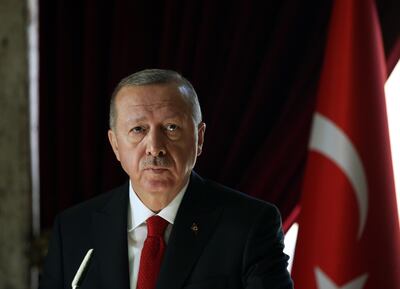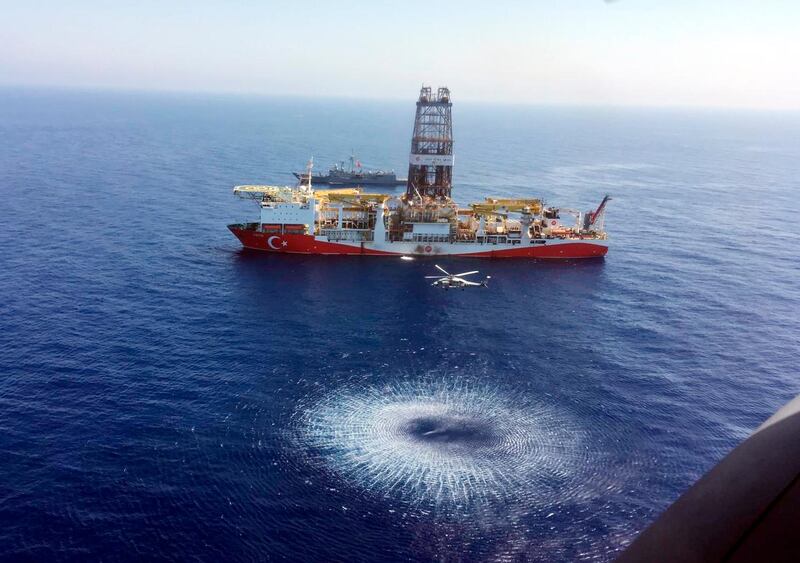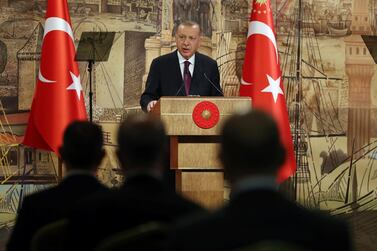Turkey’s discovery of 320 billion cubic metres of natural gas in the Black Sea on Friday “would be transformational” for a country that has traditionally relied on costly imports to meet its energy needs, according to analysts.
“Even if the official ... figure given by President Recep Tayyip Erdogan is treated as an estimate of gas in place, this is Turkey’s biggest find – by a wide margin – and one of the largest global discoveries of 2020,” said Thomas Purdie, an analyst with Wood Mackenzie’s upstream research team.
Turkey’s energy import bill stood at $41 billion (Dh150.59bn) last year. Mr Erdogan said the country intends to begin extracting gas from the field in 2023 as it pushes to become a net energy exporter.
"The depreciation of the Turkish lira [had] made things challenging for the Turkish economy. Now, Turkey can bolster its currency reserves because it may not need to spend that mammoth amount on gas," Naeem Aslam, chief market analyst at AvaTrade, told The National.
Mr Purdie said that the find also reaffirmed the Black Sea’s hydrocarbon potential after several disappointing wells in Bulgaria.
Turkey’s exploration comes after large-scale discoveries in the Eastern Mediterranean became game-changers for Egypt and Cyprus.
A 2010 US geological survey estimated that the Levant Basin in the Eastern Mediterranean could hold as much 122 trillion cubic feet of gas, which is equal to the total reserves of Iraq, the Middle East’s second-largest crude producer.
Turkey has relied on piped gas from Russia, Azerbaijan and Iran in the past and its share of liquefied natural gas imports has continued to grow.
“This discovery could have far-reaching implications for future gas imports and coming negotiations with suppliers – Gazprom, Azerbaijan and Iran,” said Murray Douglas, research director of the European gas and LNG team at Wood Mackenzie.
Mr Aslam termed the find “a game-changer”.
“Turkey will no longer need to depend on US [LNG] supplies going forward,” he said.
Turkey will hope to replicate the success of Egypt, whose economy rebounded on the back of gas discoveries in the eastern Mediterranean that began with the Zohr gasfield and turned the North African country from an importer of gas to a net exporter.
Turkish drilling ship Fatih carried out exploration activities in the Tuna-1 sector in the western Black Sea over the past month.
However, experts said the Black Sea find would need billions of dollars in investment to build production and supply infrastructure.
Mr Purdie said that it could take up to a decade for gas from the Black Sea find to be put to commercial use, with a 2023 date for extraction looking ambitious.
“It is early days, but any future development would cost billions of dollars. Deepwater projects are complex in any environment, but the Black Sea poses additional logistical challenges that must be managed,” he said.
“This is one of the factors that has stalled Romania’s Neptun Deep megaproject, located just 100 kilometres north of the Tuna well.”
Experts said Turkey’s gas discovery will also need to be appraised by the drilling of more wells in order to confirm the estimate on the size of the reserves.
Turkish Energy Minister Fatih Donmez said on Friday that the operation of the recently discovered field would be handled by state-owned energy company TPAO.

“In the upcoming period, we will do the seismic research and drilling by ourselves ... the operation will be completely handled by Turkiye Petrolleri,” Mr Donmez said.
However, experts said bringing in an international partner would benefit TPAO.
“There could be attractions despite the market outlook – highly competitive tax terms in a basin that international oil companies know increasingly well over recent years. Majors operating across the border in Romania and Bulgaria have had mixed recent success, but will take note of this momentous news,” Mr Purdie said.
Mr Donmez said Turkey could float an international tender to build a pipeline to transport the natural gas to shore.
“What worries me [are] the challenges around building a pipeline and exporting this oil, given Turkey’s tense relationship with Middle East countries,” said Ipek Ozkardeskaya, a senior analyst at Swissquote Bank.
“But overall, finding black oil will certainly have a positive impact on the lira and Turkey’s energy stocks. If it could just temper the actual sell-off due to questionable and blurry central bank policy, that is already a win.”
Turkey has been embroiled in territorial disputes with Greece and Cyprus in the eastern Mediterranean as it searches for oil and gas in contested waters. The EU has already expressed its opposition to its exploratory activities.
However, Mr Erdogan said on Friday that Turkey would speed up operations in the Mediterranean.
“We are determined to solve our energy issue,” Mr Erdogan said. “We will not stop until we become a net exporter of energy.”
Turkey consumed 45 billion cubic metres of gas in 2019, down from about 50 billion to 55 billion cubic metres a few years ago.
Robin Mills, chief executive of Qamar Energy, said the new gas reserves could “supply about 40 per cent of Turkey’s demand on a reasonable 20-year plateau”.
He said Turkey’s gas demand was falling because of economic problems and a shift to coal, renewables and eventually nuclear power.
Mr Douglas said “despite the coronavirus, Turkish gas demand has only fallen by 3 per cent [this year] versus last year. That is a less severe fall than many other European markets".
Analysts said the new find will make the Turkish gas market more competitive and create challenges for suppliers.
“Azerbaijan is safe for now, but Russia and Iran could lose volumes to the new find and to LNG imports, which have also grown. Finally, some of the gas could be exported to neighbours such as Bulgaria, Serbia and Romania, again providing competition for Russian gas,” Mr Mills said.








